At one time I was among the youngest, if not the youngest Fellow of the Australian Medical Association, and used to attend the annual Fellow’s dinner, in my case in Victoria. At one of these dinners, I got to talking to an elderly doctor named Southey. He was old enough to remember the announcement of the outbreak of the First World War. He said the jubilation in the community was palpable, hats were thrown into the air, aggressive words were launched upon an enemy a long way from Australia, of little relevance, but one which provided the backdrop of a “Boys’ Own” adventure. Among some there was an urgency to fight because it would be all over by Christmas. Could not miss the action.
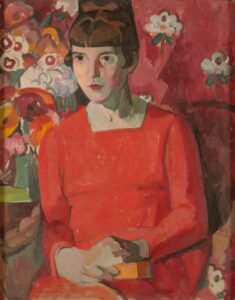
One of the most striking books I read by Christian Stead was one in which he portrayed Katherine Mansfield, almost as if she had written herself. It was a clever characterisation with an authenticity about her life during the First World War. Hers was a brief life, dying in 1922 of tuberculosis at 34 years, but the story is in fact an allegory of War. Even though not particularly close to the frontline it occurred in 1915 before trench warfare horror became established – an amorous climax with a young French author-cum-corporal, Francis Carco. There was the spice of foolhardiness admixed with desire. Her world was still one of pre-war privilege and courtesies.
Then her much loved younger brother, Lesley was killed in 1915 in France, not in the frontline but in a grenade training accident.
Near the end of the War she travelled alone to the south of France seeking a Mediterranean sanatorium cure for tuberculosis, which she had acquired but at the same time she had recurrent symptoms of her chronic gonorrhoea. No longer was there chivalry, when she was forced to ride on crowded trains where the troops returning from the Front were not inclined to give up their seats to a well-dressed woman. Privilege was dead in these railway carriages, and it was a most unhappy time for Katherine Mansfield. Because she was a prolific letter writer and diarist, often in the form of short stories, the transition of war being an adventurous jape with one of unyielding bleakness and horror is well traced through her life, as it was by Stead.
Sometime in between, thousands of Australians and New Zealanders lost their lives on a Turkish beach with a Greek name due to British folly, a recurring theme across those years, until the allies were bailed out by Australian military genius in Sir John Monash, who won the War – lest we forget!
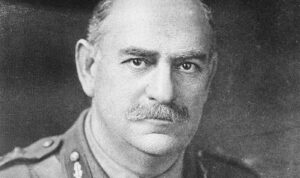
Thus, lest us not forget Monash in the celebration of an unmitigated disaster in 1915 commemorated on April 25 where now the braided strut, their heads only bowed for the obligatory one or two minutes silence. Then they straighten and, like the Bourbons, they have learnt nothing; they have forgotten nothing. Looking for another conflict. But at least, “Lest We Forget” is scrawled across the granite plinths of Australia for the collective amnesia until November, when Poppies remind us of Monash’s triumph, which put a temporary end to the misery of war.
What’s in a name
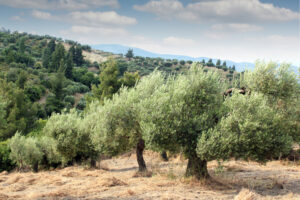
One of my favourite photographs is of an Apulian olive grove in spring, where the ground is covered with crimson Italian heather. The olive trees are almost overwhelmed by this red carpet which, in a few weeks under the Apulian sun, withers and lies dormant for another year. Apulia is one of the regions on the Adriatic regions where Albanians – gli Albanese – came and settled. There has been a long relationship between Albania and Italy, extending back into Roman times when the Roman legions burst out of the Italian peninsula and overran the Illyrian coast, where the ancestors to modern day Albanians lived.
When I read the story of Albanese’s procreation – it reminded me of a cousin of mine who, on the rebound from a disapproved love affair, met a happy-go-lucky steward from Barrow-on-Furness on one of those P&O liners that used to ply between Australia and England. He followed her to Australia. They married, settled down in a country town and begat three daughters. Let us say he had an easy life after that.
That meeting bore unmistakeable similarities to Anthony Albanese’s parents without the immediate “blessed” outcome. I was not attracted to the travails of the young Anthony, but rather to the resilience of his mother. I was a medical student when Albanese was born, but remembered well the unmarked building across the road where unmarried pregnant women were kept under the watchful eyes of nuns, before they had to make the journey across Grattan Street to the labour ward.
It was a difficult time for the unmarried mother. A colleague of mine at the time, in a different State, said that when these young women gave birth, their faces were shielded by a pillow so each never saw her baby. I cannot remember that occurring, but labour wards were certainly not the most comfortable places in those days. Being on a roster both for births and for sewing up episiotomies in the early hours of the morning was not conducive to staying around and having a friendly chat to the woman you had just delivered or sewn up. Sleep was more important.
Therefore, Albanese’s mother must have been a remarkable woman – not the least of which was keeping her child and not having him adopted out – whilst maintaining the fiction that the father had died tragically. In fact, she had met the father, Carlo Albanese, when she was a passenger and he a steward on the Fairsky. He was about to be married to a giovane donna di Apulia; and that was that. The car accident was a total fiction that Albanese’s mother invented.
Having lived in that era when abortion was a criminal offence and the “oral contraceptive” had just become available, the dilemma that Mary Ellery faced was immense. A story of tragic loss had been created. This enabled the young Albanese to adopt his father’s surname (a form of nominal baptism), yet his heritage was also inner city Irish Roman Catholic; and the fiction and pretence that his mother maintained is not unknown among the Irish. I have a strong Irish heritage where fiction is admingled with fact; let me say that Yeats was not wrong when he wrote about the Celtic Twilight.
Albanese’s mother was burdened later in life with chronic rheumatoid arthritis and she eked out a living through low paid work and a pension.
Nonetheless, I cannot get out of my mind what this woman endured, as did many of her generation, hiding. Eventually she told her son the truth.
As to the story of his finding his long lost father in Apulia, the record says that Albanese had several half-siblings. I wonder whether, if he placed an advertisement seeking Albaneses in ports where the Sitmar ships berthed, he may find he has a tribe. I’m afraid that I have no time for men like his late father, Carlo – but Albanese’s mother was something else.
Childhood Memories
Talking about Southern Italy, Sicily is one place still on “my bucket list” to visit. I have just finished reading Giuseppe Tomasi Di Lampedusa’s “Childhood Memories”. He had been born at the end of 1896 in Palermo. The man whose novel “The Leopard” became a huge best-seller after he died, was part of the Sicilian nobility as it had been fashioned through centuries of acquisition, beneficial marriages, usury and overall shrewdness by certain members.
Yet his child memories are amazingly crisp and outlined against the searing heat of Sicily from the last decade of the nineteenth century. Lampedusa was the scion of a family with vast properties, but with a perilous future in having to maintain the family fortune based on the productivity of its land holdings.
Sicily had many of these families that had survived the violence which accompanied the invasions and internecine warfare. Lampedusa refers to a noble family whose name reflected their Norman forebears. Lampedusa refers to the 1908 Messina earthquake when he lost relatives – so there were natural disasters with which to contend. Not to forget Mount Etna, which has been in almost continuous volcanic activity – a turbulent island. It is difficult to define what is a major eruption, there have been so many.
His acute observations, even as a child, of the massive discrepancy between the rich and the poor, which presaged the middle class vacuum filled by the rise of the Mafia, barely cast a shadow over Lampedusa’s childhood – and yet there is this pervasive sense of decay amid the masterpiece which is Sicily.
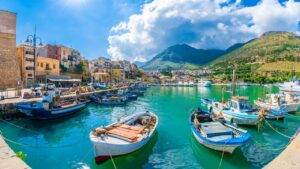
Despite all these imperfections, Sicily remains an island of fascination. After all, why do we potter around the petrified entrails of our ancestors?
The Wisdom of Islands Solomon
What an inconvenient time for Australian foreign policy to reveal the genius of Marise Payne. This bumbling Minister of an equally bumbling Department is one of the worst foreign ministers Australia has ever promoted.
Foreign ministers should have an ability to relate, and in the South Pacific arena this is particularly important. During the time he was auditioning for Foreign Minister, Andrew Peacock provided a role model. At a time when Australia had a Prime Minister – Billy McMahon – to rival the talents of our current incumbent, Peacock’s work with Michael Somare helped the transition of Papua New Guinea from colony to nation, although it was the Whitlam government that presided over the actual independence. Peacock in many ways knew that Australia had a responsibility for Melanesia, as Gordon Bilney later did when he had the Ministerial portfolio for the South Pacific.
I remember visiting Papua New Guinea several years before Independence, with the late John Knight when we were working together. John Knight had worked in the Department of Foreign Affairs and was later to become a Senator for the ACT before tragically dying whilst still a young man. It was clear from our meetings that these then young PNG legislators were well disposed towards Australia, even though I realised that being the last week TAA flew to PNG, one could never count on a seat being available on any flight even if, as I did, one had a booked ticket. Such was democracy. You learned to go with the flow. Before and after independence, Australians were ubiquitous in PNG. The number of Australian doctors who worked in New Guinea provided a groundswell of both knowledge and understanding.
As Donald Denoon has written: “Within three years, Somare’s coalition reorganised the Public Service, negotiated an aid package and renegotiated an important mining agreement. They drafted, debated and enacted a constitution, and created a planning capacity, a defence force and all the other limbs of a modern state. Secession was averted in Bougainville and in Papua, an explosive land dispute was defused around Rabaul, anxious Highlanders were mollified and the fragile coalition held together.”
Somewhat different situation in Papua New Guinea today, but the lesson is there – concern to help rather than colonial paternalism. While “fuzzy-wuzzy” was meant as a term of endearment by Australian soldiers who served in New Guinea, it was just that type of paternalism that our generation tried to eradicate, without wishing to offend the generation that fought and left the legacy, which is symbolised by the Kokoda Trail (now called Track).
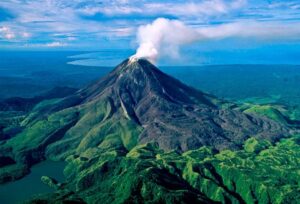
No such empathy exists with the Solomons Islanders – the British Solomon Islands, as they were called previously when under UK rule. On the other hand, the Northern Solomon Islands, known also as Bougainville, was part of the German territories mandated to Australia after WW1. This meant that Bougainville was linked to New Guinea even though ethnically they were Solomon Islanders.
Then Bougainville was shown to have one of the biggest copper and gold deposits in the World. Rio Tinto, through its subsidiary, proceeded to develop the Panguna mine and bugger up the environment such that they were forced to curtail operations by the local Bougainvilleans; yet still left a grossly contaminated river system in the south of the island.
Bougainville Copper, as the subsidiary was known, simply abandoned the site in the face of a landowner rebellion in 1989. This was largely triggered by the mine’s environmental and social impacts, including disputes over the sharing of its economic benefits and their impact on predominantly cashless societies.
Following PNG security forces’ heavy-handed intervention – allegedly under strong political pressure from Bougainville Copper – the rebellion quickly escalated into a full-blown separatist conflict that eventually engulfed all parts of the province.
By the time the hostilities ended in 1997, thousands of Bougainvilleans had lost their lives, but negotiations have since yielded the PNG Government ceding a degree of autonomy to Bougainville, given the overwhelming vote for independence. The aim is for full independence by 2027, but in the intervening period there must be resolution over ownership of the mine which, if concluded for their benefit, could make the Bougainvilleans some of the richest citizens in the World.
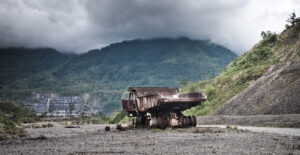
Yet, what is Australia doing about a potentially rich neighbouring independent country, once held under an Australian mandate, ethnically Solomon Islands. I presume the Chinese may be prepared to stump up the $6 billion to get the mine working and repair the environmental damage. With its current level of foresight Australia may offer a sports arena, or perhaps to teach them rugby.
How different from our role in the transition of PNG to independence in 1975. China has seized upon our lack of interest in Melanesia in general. New Zealand shares some of the culpability but its political influence is stronger in Polynesia even though Tonga is deep in debt to China. Given that the State Department in Washington has suddenly woken up to the fact that Honiara is not just an answer in a game of Trivial Pursuit, there will be belated action. The French have a presence in the South Pacific but, given how Macron views us as mendacious and les péquenards, one needs an incoming government to provide a piece of repair work to ensure co-operation.
However, Australia seems paralysed apart from the aimless pugnacity of Minister Dutton and the non-appearance of the Foreign Minister Payne.
Canberra should remember seven words: “The Republic of the Northern Solomons Islands”, as we fumble our way across Melanesia.
And by the way, what is the putative capital of this Republic called?
The People in an Ironed Mask
Below in this article in the Washington Post is a warning to the Labor party if they achieve Government and pursue their promise to establish the Centre of Disease Control & Prevention. It is about the level of autonomy and, given the way the politicians have interfered during this pandemic, it is a major question to be answered. And of course the bleats from a tourist industry don’t help maintenance of such autonomy.
The Justice Department is filing an appeal seeking to overturn a judge’s order that voided the federal mask mandate on planes and trains and in travel hub.
The notice came minutes after the Centers for Disease Control and Prevention asked the Justice Department to appeal the decision handed down by a federal judge in Florida earlier this week.
A notice of appeal was filed in federal court in Tampa.
The CDC said in a statement Wednesday that it is its “continuing assessment that at this time an order requiring masking in the indoor transportation corridor remains necessary for the public health.”
It remained unclear whether the Biden administration would ask the appeals court to grant an emergency stay to immediately reimpose the mask mandate on public transit. An emergency stay of the lower court’s ruling would be a whiplash moment for travellers and transit workers. Most airlines and airports, many public transit systems and even ride-sharing company Uber lifted their mask-wearing requirements in the hours following Monday’s ruling.
A federal judge in Florida had struck down the national mask mandate for mass transit on Monday, leading airlines and airports to swiftly repeal their requirements that passengers wear face coverings. The Transportation Security Administration said Monday that it would no longer enforce the mask requirement.
The CDC had recently extended the mask mandate, which was set to expire Monday, until May 3 to allow more time to study the BA.2 omicron subvariant, which is now responsible for the vast majority of U.S. cases. But the court ruling Monday had put that decision on hold.
The CDC said it will continue to monitor public health conditions to determine if a mandate would remain necessary. It said it believes the mandate is “a lawful order, well within CDC’s legal authority to protect public health.”
The Department was filing the appeal “in light of today’s assessment by the CDC that an order requiring masking in the transportation corridor remains necessary to protect the public health.”
Biden’s administration has offered mixed messages in the wake of the Monday ruling. While officials said Americans should heed the CDC’s guidance even if it was no longer a requirement, Biden himself suggested they had more flexibility on masking-up during transit.
After a winter surge fuelled by the omicron variant that prompted record hospitalizations, the U.S. has seen a significant drop in virus spread in recent months, leading most states and cities to drop mask mandates.
Several Northeast cities have seen a rise in hospitalisations in recent weeks, leading Philadelphia to bring back its mask mandate.
The appeal drew criticism from the U.S. Travel Association, which along with other industry groups had been pressuring the Biden administration for months to end the mask mandate for travel.
“Masks were critically important during the height of the pandemic,” said Tori Emerson Barnes, the group’s executive vice president of public affairs and policy, “but with low hospitalization rates and multiple effective health tools now widely available, from boosters to therapies to high-quality air ventilation aboard aircraft, required masking on public transportation is simply out of step with the current public health landscape.”
Prince Rupert would have loved this comment
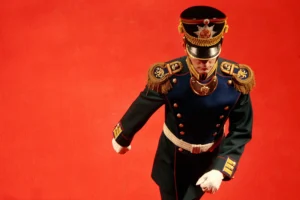
Leonid Kozhara, a Ukrainian member of the pro-Russia Party of the Regions said, fingering the button on his jacket sleeve: “Kazakhstan and Belarus are like buttons on the sleeve, but for Russia Ukraine is the sleeve and you can’t walk around without your sleeve.” – as quoted by one of the publications Prince Rupert has coveted but not bought – the New York Review of Books.
Mouse Whisper
I am known as an erudite mouse. There are always those who want me to write their citation for Mickipedia, and recently I came upon some of the brood described as “mephitic” – a word with which I was not familiar.
However, the Mickipedia tells me that Mephitis was a Roman goddess adopted from the Sabines who presided over the foul-smelling stench which was emitted through fumaroles throughout Southern Italy where volcanic activity is rife. She was both the patres et plebs guardian against malaria, because of her oversight of this miasma of hydrogen sulphide and other sulphurous vapours. There are a few unremarkable images of her, and she never made it to the Top Table. She did leave that obscure word “mephitic” to mean foul-smelling, and of course I have found distant relatives named after her – the skunk without a hyphen, mephitis mephitis.

